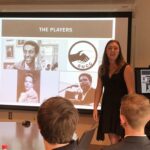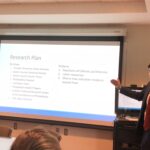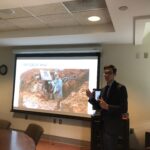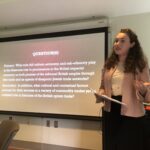Jimmy Carter Professor of History Joseph Crespino discussed his new book, Atticus Finch: The Biography, on May 3 at a Rosemary Magee Creativity Conversation in Emory’s Woodruff Library. The book will be released on May 8. The Rosemary Magee Creativity Conversations series draws attention to creativity and imagination across disciplines. Read more about the event here.
Category / Research
Johns Hopkins UP Publishes Eric L. Goldstein’s ‘On Middle Ground: A History of the Jews of Baltimore’

Associate Professor of History Eric L. Goldstein and Deborah R. Weiner co-authored On Middle Ground: A History of the Jews of Baltimore. The work has been published by Johns Hopkins University Press. Goldstein is a specialist in American Jewish history and culture, modern Jewish history, and American social and cultural history. Read more about the publication here.
Undergraduate Honors Students Present Thesis Projects
Over the last two weeks eight undergraduate honors students presented proposals for their honors theses to faculty, staff, and fellow students in the History Department. Each student has a faculty advisor for the project, and all are enrolled in the Honors Seminar HIST 495A, led by Dr. Matthew J. Payne and Dr. Judith Miller. Above are pictures of the students in action, and below is the full list of student projects.
- Tyler Breeden (Payne, Director): “Intervention by Force or Food: Origins of American Soft Power”
- Beatrix Conti (Schainker, Director): “The Sassoon Family: Jewish Engagement with British Imperialism and the Opium Trade”
- Christina Morgan (Payne, Director): “U.S. Government’s Fear of and Attack on Communist Civil Rights Leaders in the Student Nonviolent Coordinating Committee”
- Jarett Rovner (Crespino, Director): “Creating Bucks County: Surburbanization and Political Development in the Greater Philadelphia Area, 1950-1985”
- Ryan Schacklette (Allitt, Director): “Finding Place: Asian-Americans’ Struggle for Whiteness in the Twentieth Century American South”
- Will Schoderbek (Crespino, Director): “Turning the Tide in ’65: William F. Buckley, New York and the Resurgence of American Conservatism”
- Luke White (Evans-Grubbs, Director): “Romanization, Hybrid Societies, and Performances of Identity in Roman Gaul and Britain”
- Irene Zhang (Payne, Director): “A Tale of Land and Plutonium: Sino-Soviet Relations, 1953-1969”
Graduate Student Kyungtaek Kwon Wins Award From Southern Conference on Slavic Studies
Congratulations to graduate student Kyungtaek Kwon for winning the best graduate paper award from the Southern Conference on Slavic Studies. Kwon’s paper is titled, “The Boundary of Komsomol’tsy between Heroes and Vydvizhentsy in the Soviet Far Eastern City Komsomol’sk-na-Amure in the 1930s.” Associate Professor of History Matthew J. Payne is Kwon’s advisor.
New Books Series: Q & A with Ellie R. Schainker about ‘Confessions of the Shtetl’
Ellie R. Schainker, Arthur Blank Family Foundation Assistant Professor of Modern European Jewish History, published Confessions of the Shtetl: Converts from Judaism in Imperial Russia, 1817-1906 with Stanford University Press in 2016. The book won the 2017 National Jewish Book Award for Writing Based on Archival Material (JDC-Herbert Katzki Award). Below, she offers a glimpse into the making of the monograph as a part of the History Department’s series on recent faculty publications.
Books are produced over years if not decades. Give us a sense for the lifespan of this book, from initial idea to final edits.
Confessions of the Shtetl was born during my course work in grad school from the footnotes of two articles I stumbled across. I was part of a second-wave of scholars trained in the post-1991 era when former Soviet archives were newly open to western researchers. I was interested in Russian Jewish history and these articles indicated that there were treasure troves of archival material—should researchers ever gain access–documenting conversions from Judaism in the imperial Russian borderlands, or the famed “shtetls” (Yiddish, small towns) of Eastern Europe that had been idealized by nostalgic modernists and post-Holocaust mourners as the last outpost of authentic Jewish culture and solidarity in the modern period. These footnotes suggested that there was a larger untold story of interfaith encounter and border-crossing in the demographic heartland of European Jewry in the nineteenth and early twentieth centuries. I hoped that these stories might help us reconceptualize the religious and ethnic diversity of the empire’s western borderlands, the fluidity and permeability of boundaries between Jewish and non-Jewish worlds, and the relationship between ethno-religious groups and the state which tolerated and even sponsored religious diversity.
What was the research process like?
It was long and exciting. It took me to Russia, Ukraine, Israel, and New York City during my dissertation years and my early assistant professor years at Emory. Two aspects of the research stand out: 1) I thought I was fluent in Russian till I had to decipher hand-written nineteenth-century Cyrillic in the archives, and I briefly considered switching careers. 2) I came to appreciate the Russian archival system which has researchers sign a slip of paper in each archival folio listing every person who ever ordered and read that file. It looped me into a group of scholars whose footsteps I was following in and whose interests I shared. It became a kind of game for me in the archives to see if I could discover new files and be the first to sign my name, and it made me feel as part of a virtual research cohort during the sometimes long, lonely days in the archives.
Do you have a favorite chapter or section?
My favorite section is Part II, which I consider the heart of the book. This section features many microhistories of converts, their Christian neighbors and romantic partners, and their often irate family and community members. I love it because it brings to life the human drama of faith and apostasy, and gets at the pathos of historical phenomena that often get overlooked in social-scientific analyses of minority integration and assimilation.
How does this project align with your broad research agenda?
This project is a first step in studying toleration, imperialist critiques of native religion, and how these and other modern developments have allowed people to articulate and experience faith in new ways.
Fellowship Will Support Research by Undergraduate Beatrix Conti
Congratulations to History Honors student Beatrix Conti, who was recently awarded a Halle Institute – Fox Center for Humanistic Inquiry Global Research Fellowship for conducting research during the Summer of 2018. Conti is an English and History double major, and her project is entitled The Sassoon Family: Jewish Engagement with British Imperialism and the Opium Trade. View the full list of fellows here.
Undergraduate Liza Gellerman Wins Fellowship at Fox Center, Grant for Research Abroad
Emory’s Tam Institute for Jewish Studies has awarded a research and travel grant to History Honors student Liza Gellerman. The grant will support Gellerman’s research during the Summer of 2018. Gellerman also won an Undergraduate Humanities Honors Fellowship for the fall of 2018 from the Bill and Carol Fox Center for Humanistic Inquiry. Congratulations!
Carol Anderson Wins Guggenheim Fellowship
Congratulations to Dr. Carol Anderson, Charles Howard Candler Professor and Chair of African American Studies, for winning a 2018 Guggenheim Fellowship in constitutional studies. In 2016 Anderson published the New York Times bestseller White Rage: The Unspoken Truth of Our Racial Divide (Bloomsbury). Her next book, One Person, No Vote, is slated for publication this September. Read more about Dr. Anderson and the fellowship here.
New Books Series: Q & A with Dawn Peterson about ‘Indians in the Family’
Assistant Professor of History Dawn Peterson published Indians in the Family: Adoption and the Politics of Antebellum Expansion with Harvard University Press in June of 2017. Below, she offers a glimpse into the making of the monograph as a part of the History Department’s series on recent faculty publications.
Books are produced over years if not decades. Give us a sense for the lifespan of this book, from initial idea to final edits.
I first came across the sources that gave this book life around 2004 after reading Michael Paul Rogin’s groundbreaking book, Fathers and Children: Andrew Jackson and the Subjugation of the American Indian. I spent the following eleven years tracking down documents, contextualizing them within American Indian history and slavery studies, and putting my ideas down on paper. I completed my final copyedits in the spring of 2017, a few months before the book was released. So, all in all, the book took well over a decade from start to finish.
What was the research process like?
The sources I utilize in Indians in Indians in the Family come from archives across the country. I would find bits and pieces of information on the individuals about whom I wrote in one set of documents and then, going off of hunches based on what I had learned from these sources, I would travel to a different archive in the hopes of finding additional documents that would allow me to get a greater sense of the events and actions that shaped their lives. For example, tracking down sources relating to James McDonald (Choctaw)—one of the adoptees whose life greatly influenced the narrative of my book—ended up involving travels to collections in what is currently California, Oklahoma, Kentucky, and Washington, D.C. I was also incredibly fortunate to swap research with other scholars who shared my interests. Indeed, as I got deeper into my book, I connected with a number of people—including descendants of some of the individuals about whom I wrote—who generously collaborated with me by sharing ideas and sources or by pointing me to collections with which I was not yet familiar. Their insights on kinship, archives, and genealogy were crucial to the formation of my book.
Do you have a favorite chapter or section?
I can’t say that I do. Each chapter dealt with issues that were central to my own personal, intellectual, and political journey so it feels impossible for me to settle on any particular one as a favorite.
How does this project align with your broad research agenda?
This book formed in the wake of the September 11, 2001 attacks and the second Bush administration’s so-called War on Terror. As the United States embroiled itself in new imperial wars overseas and continued assaults on vulnerable communities within its borders, I found myself needing to better understand the intersecting roles of violence, empire, and kinship in North American history. Why, for example, did the United States imagine itself as a “national family” victimized by 9/11 and how did ideas about race, gender, and sexuality orient this national kinship structure? Why and how did “family” come to play such an important role in U.S. nationalism and what role did empire play in shaping it? I found many answers to these questions in the roots of U.S. imperialism, which of course took ground in Indian Country and were strengthened by the enslavement of Africans and African Americans. My first book focused on adoption as a vantage point into the gendered and racialized inequalities that shaped and oriented ideas about an “American family” during the post-Revolutionary period. My second project examines Southeast Indian women’s trade relationships in the late eighteenth and early nineteenth centuries to better understand how notions of kinship among people of European, African, and American Indian descent shaped economic decisions and produced concepts of race, gender, and sovereignty.
History Alumnus Preston Hogue Publishes Honors Thesis on ‘Atlanta Studies’
History alumnus Preston Hogue recently published a revised version of his undergraduate honors thesis on Atlanta Studies. The multimedia piece is entitled, “The Tie that Binds: White Church Response to Neighborhood Racial Change in Atlanta, 1960-1985.” Hogue graduated with highest honors as a joint major in Religion and History in Spring 2013.







